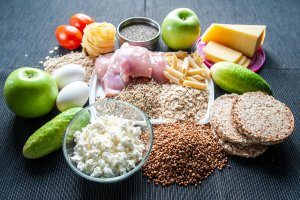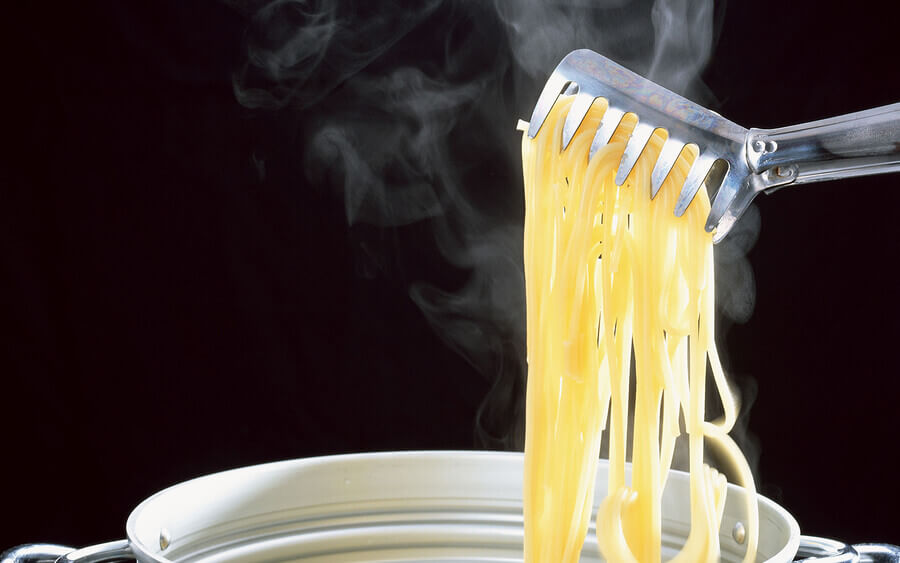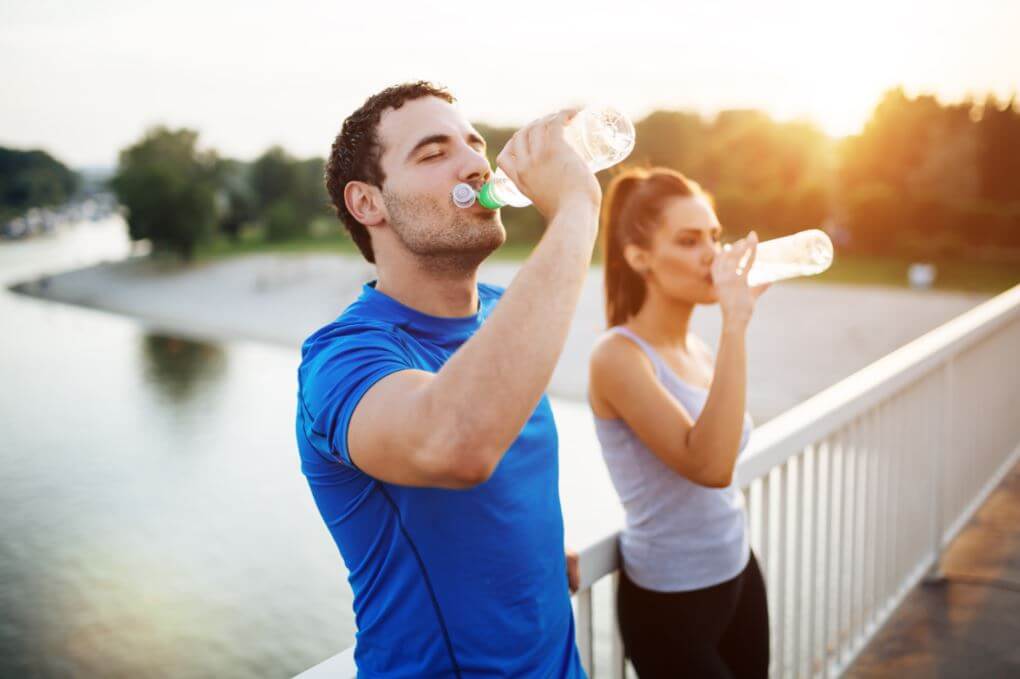Nutrition for Soccer Players: The Basics

Optimizing your diet can boost your sports performance. Because of this, proper nutrition for soccer players is the basis of great results on and off the field. Today we’ll cover some nutritional strategies that soccer players can use to improve their game.
Field team sports such as soccer and baseball, are intermittently high intensity. This means that over any given length of time, players will go through moments of very intense effort followed by short moments of rest. On top of this, depending on the position an athlete plays there might be even more variations in the activity levels.
Soccer as a sport
Before we dive into the nutrition for soccer players, it’s important to examine soccer as a sport.
For starters, the playing field is rectangular and measures between 100 and 130 meters long by 50 – 100 meters wide. In the case of international tournaments, the field should measure between 110 and 120 meters long and between 70 and 80 meters wide.
Then, each team has eleven players and each one of the players has a specific role in the game.
Weight gain: a common nutritional issue in soccer
Even among professional soccer players, there are plenty of nutritional issues that arise. This is especially evident during the off-season when players return home and train for themselves.
During these months, athletes tend to gain weight, mainly due to physical rest. Because of this, it’s important to control weight gain and focus pre-season workouts on regaining physical fitness.
Nutrition for soccer players: education is key
One of the main reasons why athletes usually have problems with their nutrition is lack of knowledge. It’s very common for players, after leaving the family nucleus, to end up in a high-performance center for athletes. Then, in these centers, others prepare athlete’s food and everyone receives the same meal.
Because of this, when athletes leave the comfort of training centers they often have no idea how to prepare a balanced diet for themselves. Usually, these young adults are lost and tend to resort to precooked and fast foods. What can we do to avoid this?
Of course, there are simple culinary techniques that are easy to learn. Understanding basic and healthy techniques such as steaming or grilling food is a valuable tool for athletes. However, it’s important that even in the context of their soccer club they’re given the tools to favor their cooking skills and learning process.

The importance of eating well
The key when teaching nutrition for soccer players is helping athletes to understand why they should learn this skill. In fact, a balanced, planned diet boosts performance and recovery between training sessions. In addition, good nutritional status and proper hydration lowers the risk of injury. This happens in all sports, including soccer.
Complementing soccer training with proper nutrition
Of course, an athlete’s training must be adapted to their health status and incorporate periods of rest.
After rest periods, the intensity of the training picks up again. Finally, shortly after the next game, the coach lowers the training workload again in preparation for the next meeting.
From a nutritional point of view, these sessions serve to test strategies before the big day: the game. Thus, the nutrition of soccer players has to be adapted to the type of training.
Evidently, a weightlifting athlete won’t have the same nutritional requirements as a soccer player. It’s very different to eat for strength training than to prepare for high-intensity cardio.
Nevertheless, regardless of the type of work that the athlete will be doing, the food must be carefully scheduled and adapted to their specific needs.
Nutrition for resistance training
In the case of resistance training, athletes should have a higher carb intake. Of course, the specific amount varies from one person to another.
However, for a player who trains several times a week for long periods of time at a medium to high intensity, nutritionists recommend at least 5-8 grams of carbohydrates per kilogram of body weight per day.
If a player fails to fulfill their required carb intake, it can have negative consequences in their performance. They’ll probably feel fatigued, tired and this could potentially have repercussions on the day of the game.
Nutrition for strength training
On the other hand, for athletes focusing on strength training their nutrition plan should probably look a bit different. Of course, the specific amounts will depend on the type of training: training in a weight room is different than training with plyometric exercises in the field.
Either way, on days focused on strength training, athletes should slightly boost their protein intake. This would allow them to keep increase their muscle and prevent fatigue as well.
Hydration: a fundamental concept in nutrition for soccer players
Evidently, proper hydration should be one of the pillars of training. Good hydration prevents injuries and improves athletic performance. In hot environments, it’s important to readjust the quantity and you can even try a water-replacement drink.
Of course, to choose an isotonic drink or another water replacement, you have to consider the sweat loss. Other important considerations are the intensity and duration of the exercise as well as the environment in which the training takes place.

One of the usual mistakes is to drink water only when the sensation of thirst hits you. To check if hydration was successful after a training session, you can do this simple experiment:
Weigh yourself -or the athlete- before and after the exercise. The difference in weight corresponds to the water loss due to sweating.
If the weight variation is greater than 2 percent of body weight, it means that the athlete is lacking proper hydration. This means, in the case of someone weighing 75 kg, that the difference observed cannot be greater than 1.5 kg.
In short, soccer and many other sports demand a structured diet plan. Because food is the ‘fuel’ that we offer to our body, maintaining a balanced diet ensures good performance.
Of course, we always recommend that anyone (who wants to make dietary changes) consults a nutritionist beforehand.
Optimizing your diet can boost your sports performance. Because of this, proper nutrition for soccer players is the basis of great results on and off the field. Today we’ll cover some nutritional strategies that soccer players can use to improve their game.
Field team sports such as soccer and baseball, are intermittently high intensity. This means that over any given length of time, players will go through moments of very intense effort followed by short moments of rest. On top of this, depending on the position an athlete plays there might be even more variations in the activity levels.
Soccer as a sport
Before we dive into the nutrition for soccer players, it’s important to examine soccer as a sport.
For starters, the playing field is rectangular and measures between 100 and 130 meters long by 50 – 100 meters wide. In the case of international tournaments, the field should measure between 110 and 120 meters long and between 70 and 80 meters wide.
Then, each team has eleven players and each one of the players has a specific role in the game.
Weight gain: a common nutritional issue in soccer
Even among professional soccer players, there are plenty of nutritional issues that arise. This is especially evident during the off-season when players return home and train for themselves.
During these months, athletes tend to gain weight, mainly due to physical rest. Because of this, it’s important to control weight gain and focus pre-season workouts on regaining physical fitness.
Nutrition for soccer players: education is key
One of the main reasons why athletes usually have problems with their nutrition is lack of knowledge. It’s very common for players, after leaving the family nucleus, to end up in a high-performance center for athletes. Then, in these centers, others prepare athlete’s food and everyone receives the same meal.
Because of this, when athletes leave the comfort of training centers they often have no idea how to prepare a balanced diet for themselves. Usually, these young adults are lost and tend to resort to precooked and fast foods. What can we do to avoid this?
Of course, there are simple culinary techniques that are easy to learn. Understanding basic and healthy techniques such as steaming or grilling food is a valuable tool for athletes. However, it’s important that even in the context of their soccer club they’re given the tools to favor their cooking skills and learning process.

The importance of eating well
The key when teaching nutrition for soccer players is helping athletes to understand why they should learn this skill. In fact, a balanced, planned diet boosts performance and recovery between training sessions. In addition, good nutritional status and proper hydration lowers the risk of injury. This happens in all sports, including soccer.
Complementing soccer training with proper nutrition
Of course, an athlete’s training must be adapted to their health status and incorporate periods of rest.
After rest periods, the intensity of the training picks up again. Finally, shortly after the next game, the coach lowers the training workload again in preparation for the next meeting.
From a nutritional point of view, these sessions serve to test strategies before the big day: the game. Thus, the nutrition of soccer players has to be adapted to the type of training.
Evidently, a weightlifting athlete won’t have the same nutritional requirements as a soccer player. It’s very different to eat for strength training than to prepare for high-intensity cardio.
Nevertheless, regardless of the type of work that the athlete will be doing, the food must be carefully scheduled and adapted to their specific needs.
Nutrition for resistance training
In the case of resistance training, athletes should have a higher carb intake. Of course, the specific amount varies from one person to another.
However, for a player who trains several times a week for long periods of time at a medium to high intensity, nutritionists recommend at least 5-8 grams of carbohydrates per kilogram of body weight per day.
If a player fails to fulfill their required carb intake, it can have negative consequences in their performance. They’ll probably feel fatigued, tired and this could potentially have repercussions on the day of the game.
Nutrition for strength training
On the other hand, for athletes focusing on strength training their nutrition plan should probably look a bit different. Of course, the specific amounts will depend on the type of training: training in a weight room is different than training with plyometric exercises in the field.
Either way, on days focused on strength training, athletes should slightly boost their protein intake. This would allow them to keep increase their muscle and prevent fatigue as well.
Hydration: a fundamental concept in nutrition for soccer players
Evidently, proper hydration should be one of the pillars of training. Good hydration prevents injuries and improves athletic performance. In hot environments, it’s important to readjust the quantity and you can even try a water-replacement drink.
Of course, to choose an isotonic drink or another water replacement, you have to consider the sweat loss. Other important considerations are the intensity and duration of the exercise as well as the environment in which the training takes place.

One of the usual mistakes is to drink water only when the sensation of thirst hits you. To check if hydration was successful after a training session, you can do this simple experiment:
Weigh yourself -or the athlete- before and after the exercise. The difference in weight corresponds to the water loss due to sweating.
If the weight variation is greater than 2 percent of body weight, it means that the athlete is lacking proper hydration. This means, in the case of someone weighing 75 kg, that the difference observed cannot be greater than 1.5 kg.
In short, soccer and many other sports demand a structured diet plan. Because food is the ‘fuel’ that we offer to our body, maintaining a balanced diet ensures good performance.
Of course, we always recommend that anyone (who wants to make dietary changes) consults a nutritionist beforehand.
All cited sources were thoroughly reviewed by our team to ensure their quality, reliability, currency, and validity. The bibliography of this article was considered reliable and of academic or scientific accuracy.
- Shirreffs SM, Sawka M, Stone M. Water and electrolyte needs for soccer training and match play. https://www.ncbi.nlm.nih.gov/pubmed/16766499
- Burke LM, Loucks A, Broad. Macronutrients and energy for training and recovery. https://www.ncbi.nlm.nih.gov/pubmed/16766497
- Nutrition strategies for soccer: counteracting heat, cold, high altitude and jet lag. Armstrong LE. https://www.ncbi.nlm.nih.gov/pubmed/16766501
This text is provided for informational purposes only and does not replace consultation with a professional. If in doubt, consult your specialist.








